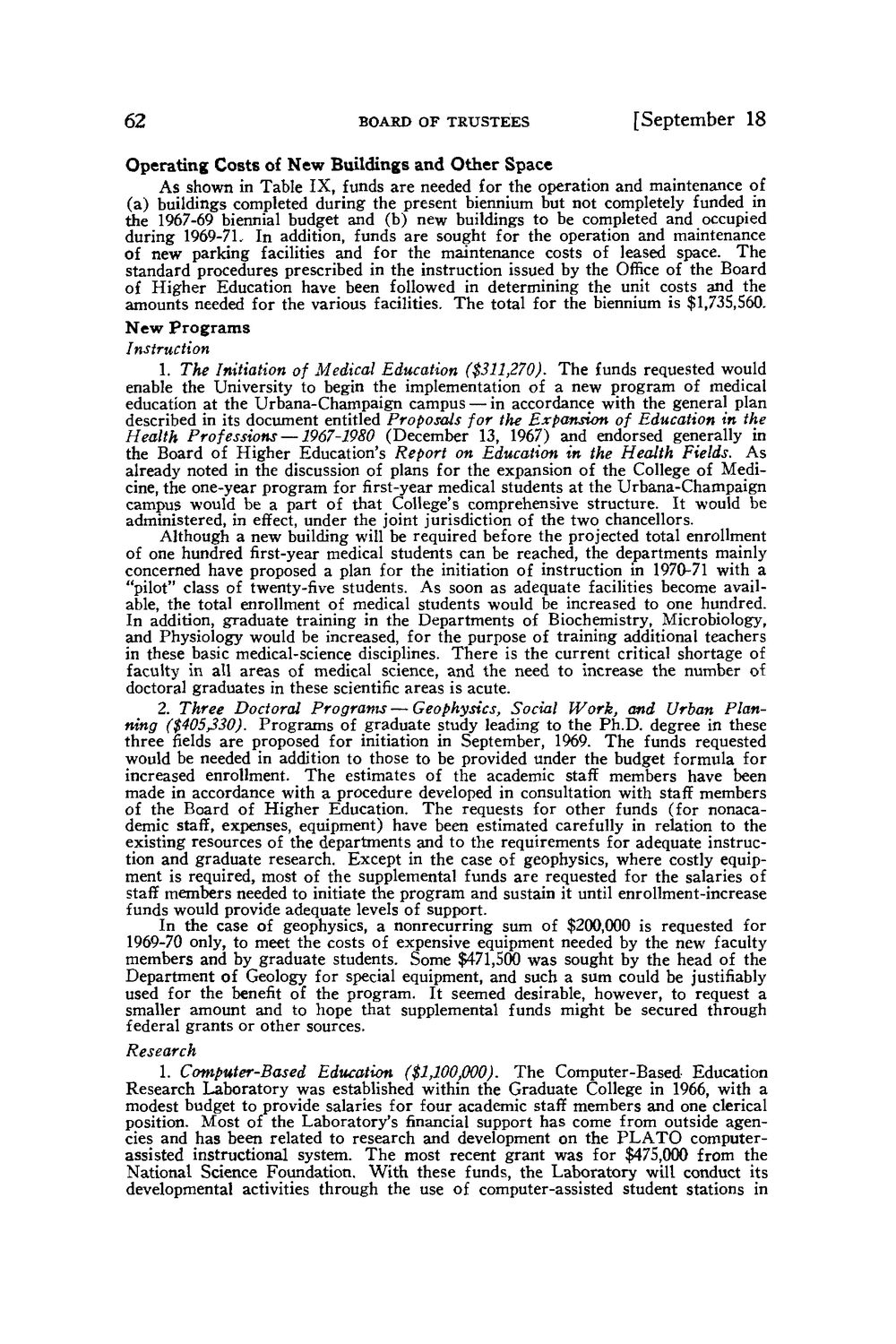| |
| |
Caption: Board of Trustees Minutes - 1970
This is a reduced-resolution page image for fast online browsing.

EXTRACTED TEXT FROM PAGE:
62 BOARD OF TRUSTEES [September 18 Operating Costs of N e w Buildings and Other Space As shown in Table I X , funds are needed for the operation and maintenance of (a) buildings completed during the present biennium but not completely funded in the 1967-69 biennial budget and (b) new buildings to be completed and occupied during 1969-71. In addition, funds are sought for the operation and maintenance of new parking facilities and for the maintenance costs of leased space. The standard procedures prescribed in the instruction issued by the Office of the Board of Higher Education have been followed in determining the unit costs and the amounts needed for the various facilities. The total for the biennium is $1,735,560. N e w Programs Instruction 1. The Initiation of Medical Education ($311,270). The funds requested would enable the University to begin the implementation of a new program of medical education at the Urbana-Champaign campus — in accordance with the general plan described in its document entitled Proposals for the Expansion of Education in the Health Professions —19671980 (December 13, 1967) and endorsed generally in the Board of Higher Education's Report on Education in the Health Fields. As already noted in the discussion of plans for the expansion of the College of Medicine, the one-year program for first-year medical students at the Urbana-Champaign campus would be a part of that College's comprehensive structure. It would be administered, in effect, under the joint jurisdiction of the two chancellors. Although a new building will be required before the projected total enrollment of one hundred first-year medical students can be reached, the departments mainly concerned have proposed a plan for the initiation of instruction in 1970-71 with a "pilot" class of twenty-five students. As soon as adequate facilities become available, the total enrollment of medical students would be increased to one hundred. In addition, graduate training in the Departments of Biochemistry, Microbiology, and Physiology would be increased, for the purpose of training additional teachers in these basic medical-science disciplines. There is the current critical shortage of faculty in all areas of medical science, and the need to increase the number of doctoral graduates in these scientific areas is acute. 2. Three Doctoral Programs — Geophysics, Social Work, and Urban Planning ($405,330). Programs of graduate study leading to the Ph.D. degree in these three fields are proposed for initiation in September, 1969. The funds requested would be needed in addition to those to be provided under the budget formula for increased enrollment. The estimates of the academic staff members have been made in accordance with a procedure developed in consultation with staff members of the Board of Higher Education. The requests for other funds (for nonacademic staff, expenses, equipment) have been estimated carefully in relation to the existing resources of the departments and to the requirements for adequate instruction and graduate research. Except in the case of geophysics, where costly equipment is required, most of the supplemental funds are requested for the salaries of staff members needed to initiate the program and sustain it until enrollment-increase funds would provide adequate levels of support. In the case of geophysics, a nonrecurring sum of $200,000 is requested for 1969-70 only, to meet the costs of expensive equipment needed by the new faculty members and by graduate students. Some $471,500 was sought by the head of the Department of Geology for special equipment, and such a sum could be justifiably used for the benefit of the program. It seemed desirable, however, to request a smaller amount and to hope that supplemental funds might be secured through federal grants or other sources. Research 1. Computer-Based Education ($1,100,000). The Computer-Based Education Research Laboratory was established within the Graduate College in 1966, with a modest budget to provide salaries for four academic staff members and one clerical position. Most of the Laboratory's financial support has come from outside agencies and has been related to research and development on the P L A T O computerassisted instructional system. The most recent grant was for $475,000 from the National Science Foundation. With these funds, the Laboratory will conduct its developmental activities through the use of computer-assisted student stations in
| |